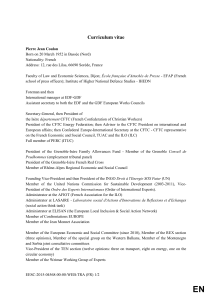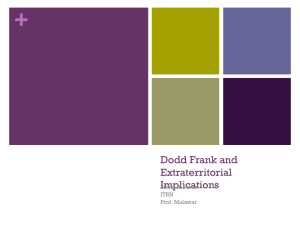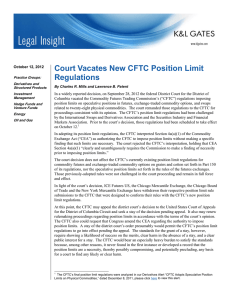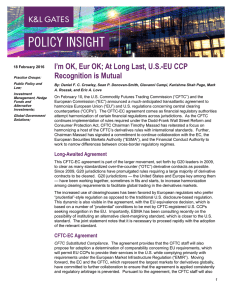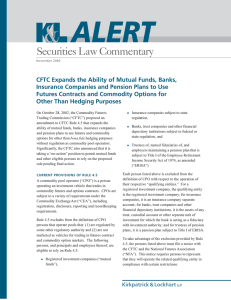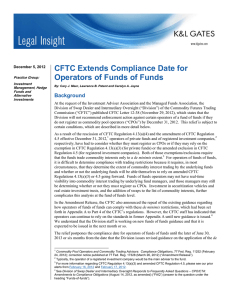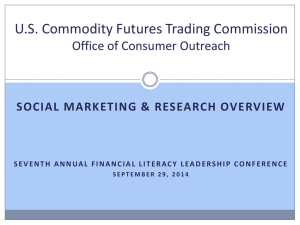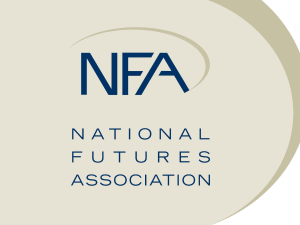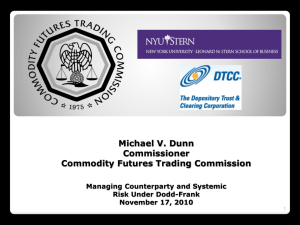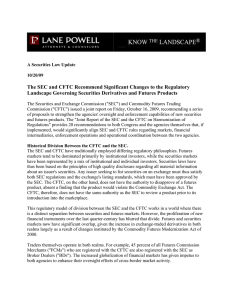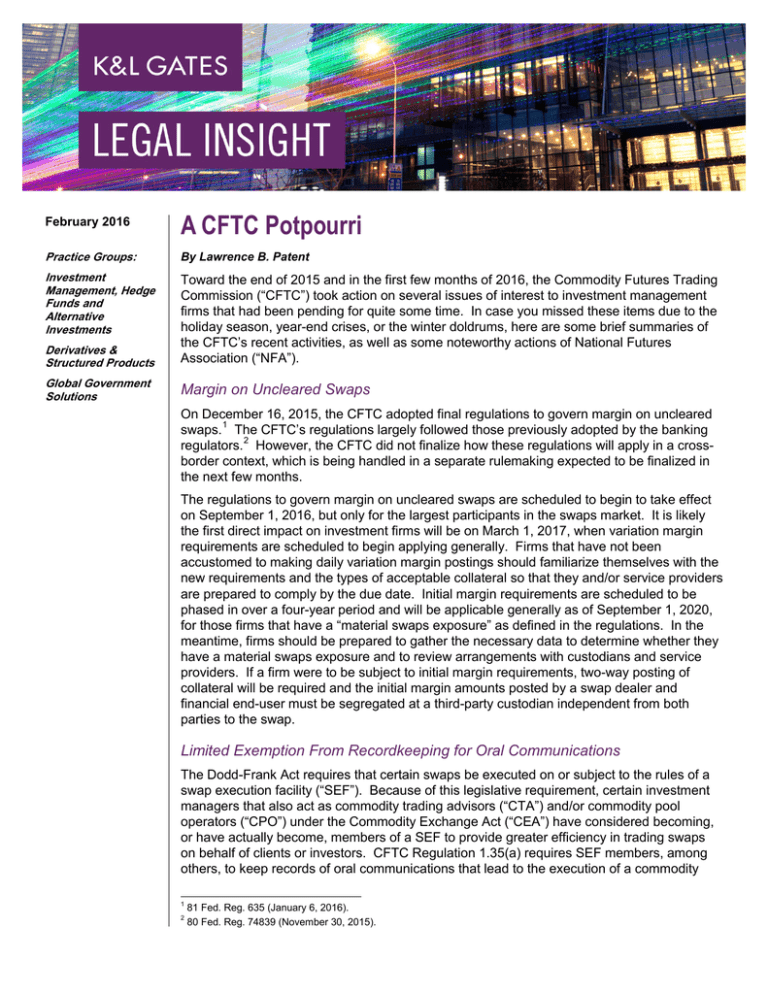
February 2016
A CFTC Potpourri
Practice Groups:
By Lawrence B. Patent
Investment
Management, Hedge
Funds and
Alternative
Investments
Derivatives &
Structured Products
Toward the end of 2015 and in the first few months of 2016, the Commodity Futures Trading
Commission (“CFTC”) took action on several issues of interest to investment management
firms that had been pending for quite some time. In case you missed these items due to the
holiday season, year-end crises, or the winter doldrums, here are some brief summaries of
the CFTC’s recent activities, as well as some noteworthy actions of National Futures
Association (“NFA”).
Global Government
Solutions
Margin on Uncleared Swaps
On December 16, 2015, the CFTC adopted final regulations to govern margin on uncleared
swaps. 1 The CFTC’s regulations largely followed those previously adopted by the banking
regulators. 2 However, the CFTC did not finalize how these regulations will apply in a crossborder context, which is being handled in a separate rulemaking expected to be finalized in
the next few months.
The regulations to govern margin on uncleared swaps are scheduled to begin to take effect
on September 1, 2016, but only for the largest participants in the swaps market. It is likely
the first direct impact on investment firms will be on March 1, 2017, when variation margin
requirements are scheduled to begin applying generally. Firms that have not been
accustomed to making daily variation margin postings should familiarize themselves with the
new requirements and the types of acceptable collateral so that they and/or service providers
are prepared to comply by the due date. Initial margin requirements are scheduled to be
phased in over a four-year period and will be applicable generally as of September 1, 2020,
for those firms that have a “material swaps exposure” as defined in the regulations. In the
meantime, firms should be prepared to gather the necessary data to determine whether they
have a material swaps exposure and to review arrangements with custodians and service
providers. If a firm were to be subject to initial margin requirements, two-way posting of
collateral will be required and the initial margin amounts posted by a swap dealer and
financial end-user must be segregated at a third-party custodian independent from both
parties to the swap.
Limited Exemption From Recordkeeping for Oral Communications
The Dodd-Frank Act requires that certain swaps be executed on or subject to the rules of a
swap execution facility (“SEF”). Because of this legislative requirement, certain investment
managers that also act as commodity trading advisors (“CTA”) and/or commodity pool
operators (“CPO”) under the Commodity Exchange Act (“CEA”) have considered becoming,
or have actually become, members of a SEF to provide greater efficiency in trading swaps
on behalf of clients or investors. CFTC Regulation 1.35(a) requires SEF members, among
others, to keep records of oral communications that lead to the execution of a commodity
1
2
81 Fed. Reg. 635 (January 6, 2016).
80 Fed. Reg. 74839 (November 30, 2015).
A CFTC Potpourri
interest transaction (“Oral Pre-Trade Communications”). The CFTC had previously
exempted CPOs from this requirement, but only provided relief from its enforcement against
CTAs through a series of time-limited staff no-action letters. On December 18, 2015, the
CFTC amended Regulation 1.35(a) to exempt CTAs that are SEF members from the
requirement to record and keep Oral Pre-Trade Communications.3 This should make it
easier for CTAs to become SEF members and thus better able to service client and investor
needs regarding swap transactions. However, subject to certain exceptions, these CPOs
and CTAs that are SEF members must keep records of written communications that lead to
the execution of a commodity interest transaction and related cash or forward transactions.
Regulation AT
On November 24, 2015, the CFTC proposed for public comment regulations that would
govern automated trading on designated contract markets (“DCM”). 4 This proposal is wideranging, but of greatest interest to investment managers is the concept of an “AT Person,”
which would include registered CPOs and CTAs that engage in automated trading as defined
in the proposal. AT Persons would be subject to various requirements, including (1) pretrade risk controls; (2) written policies and procedures regarding (i) development and testing
of software; (ii) continuous real-time monitoring by knowledgeable staff; and (iii) training of
appropriate personnel; (3) submission of an annual report concerning a firm’s automated
trading activities; and (4) maintenance of a source code repository that would be open to
inspection by any member of the CFTC staff or the U.S. Department of Justice. Due to the
breadth of the proposal, the CFTC has provided a 90-day period for public comment, which
expires on March 16, 2016.
Alternative to Fingerprinting of Foreign Natural Persons
Natural persons applying for registration as associated persons (“AP”) under the CEA or to
be listed as principals of a firm are generally required to provide a fingerprint card as part of
the application. The fingerprint card is transmitted to the Federal Bureau of Investigation
(and sometimes to Interpol if the person has resided abroad recently) to determine if the
person neglected to disclose criminal matters in his or her background. Some non-U.S.
persons have objected to this requirement in the past, often citing cultural differences in
home countries where fingerprinting is less prevalent than in the United States. As its first
regulatory proposal of this year, on January 4, 2016, the CFTC proposed an alternative to
the fingerprint requirement for natural persons located outside of the United States that
would permit a sponsor of the person seeking registration as an AP or listing as a principal to
certify that a criminal history background check for the individual has been performed within
the past year and it revealed no matters that would constitute a statutory disqualification
under CEA Sections 8a(2) or 8a(3). 5 The proposal codifies and broadens the relief
previously provided by CFTC Staff Letters 12-49 (principals) and 13-29 (APs). 6
3
80 Fed. Reg. 80247 (December 24, 2015).
80 Fed. Reg. 78823 (December 17, 2015).
5
81 Fed. Reg. 1359 (January 12, 2016).
6
CFTC Staff Letter 12-49, issued on December 11, 2012, is available at the following URL:
http://www.cftc.gov/ucm/groups/public/@lrlettergeneral/documents/letter/12-49.pdf, and CFTC Staff Letter 13-29, issued
on June 21, 2013 is available at the following URL:
http://www.cftc.gov/idc/groups/public/@lrlettergeneral/documents/letter/13-29.pdf.
4
2
A CFTC Potpourri
Exemption From Registration for Non-U.S. Intermediaries
In another action that should help persons located outside the United States to access U.S.
markets, the CFTC staff has issued a no-action letter that will make it easier for persons
located outside the United States to act as intermediaries for customers, clients and
investors that are also located outside the United States and seek to trade commodity
interests on or subject to the rules of a DCM or SEF or opposite a U.S. counterparty in an
off-exchange swap transaction. CFTC Regulation 3.10(c)(3)(i) exempts such non-U.S.
intermediaries from registration under the CEA, provided the resulting transaction is
submitted for clearing through a futures commission merchant registered under the CEA. In
response to a request that the clearing requirement is unreasonable for swaps for which the
CFTC has not adopted a clearing mandate, the no-action letter permits an intermediary that
could otherwise claim exemption from registration under CFTC Regulation 3.10(c)(3)(i) to
continue to be able to do so even if some of the transactions involved are uncleared swaps,
provided there is no clearing mandate for such swaps. 7 The relief provided by the CFTC
staff also benefits U.S. firms that sub-advise commodity pools or separately managed
accounts of a CPO or CTA that wishes to take advantage of the exemption from registration
under CFTC Regulation 3.10(c)(3)(i). These U.S. firms can now make investment decisions
for the commodity pools or separately managed accounts involving uncleared swaps and
remain in compliance with NFA Bylaw 1101, which prohibits NFA members from doing
business with a person engaging in activity that generally requires registration under the
CEA unless the person is so registered or exempt from such registration.
Re-Affirmation of Exemptions From Registration
Various claims of exemption from registration under the CEA must now be re-affirmed on an
annual basis. For investment managers, this would include claims of CPO exemption under
CFTC Regulation 4.5 for operators of certain types of collective investment vehicles (this is
actually an exclusion from the CPO definition) or under CFTC Regulation 4.13(a)(3) based
upon a de minimis amount of commodity interest trading by the pools operated, or claims of
exemption from CTA registration under CFTC Regulation 4.14(a)(8) based upon the type of
collective investment vehicle that a firm advises. Because 2016 is a leap year, the due date
for re-affirmation is February 29, rather than March 1 as will be the case in most years. Reaffirmations must be made using NFA’s Electronic Exemption System.
As noted above, NFA Bylaw 1101 requires that NFA members not do business with firms
acting in a capacity that generally requires registration under the CEA unless such other firm
is so registered or is appropriately claiming exemption from registration. Investment
managers that are NFA members, if they have not already checked whether firms with which
they deal regarding commodity interest transactions (such as CTAs or sub-advisors) have reaffirmed their exemption claims, should do so promptly as part of their due diligence under
NFA Bylaw 1101. Firms that previously claimed exemption and wish to remain active in
commodity interest markets must either re-affirm the exemption, register in an appropriate
capacity, or be able to claim a self-executing exemption, such as that provided by CEA
Section 4m(1).
7
CFTC Staff Letter 16-08 (February 12, 2016), is available at the following URL:
http://www.cftc.gov/idc/groups/public/@lrlettergeneral/documents/letter/16-08.pdf.
3
A CFTC Potpourri
Cybersecurity
NFA’s Cybersecurity Interpretive Notice will become effective on March 1, 2016, and applies
to all membership categories. The Cybersecurity Interpretive Notice requires each NFA
member to adopt and enforce an information systems security program appropriate to its
circumstances. K&L Gates has been a leader in providing information regarding
cybersecurity for the investment management community over the past year, and a series of
webinars on this topic may be accessed through the K&L Gates Hub on the K&L Gates
website. In addition, K&L Gates is offering five hours of counseling on cybersecurity at a
fixed fee. Please contact your K&L Gates attorney if you would like more information about
this offer or if you have questions about any of the items discussed above.
Author:
Lawrence B. Patent
lawrence.patent@klgates.com
+1.202.778.9219
Anchorage
Austin
Fort Worth
Frankfurt
Orange County
Beijing
Berlin
Harrisburg
Palo Alto
Paris
Boston
Hong Kong
Perth
Brisbane
Houston
Pittsburgh
Brussels
London
Portland
Charleston
Los Angeles
Raleigh
Charlotte
Melbourne
Research Triangle Park
Chicago
Miami
Dallas
Milan
San Francisco
Doha
Newark
Dubai
New York
São Paulo
Seattle
Seoul Shanghai Singapore Sydney Taipei Tokyo Warsaw Washington, D.C. Wilmington
K&L Gates comprises approximately 2,000 lawyers globally who practice in fully integrated offices located on five
continents. The firm represents leading multinational corporations, growth and middle-market companies, capital
markets participants and entrepreneurs in every major industry group as well as public sector entities, educational
institutions, philanthropic organizations and individuals. For more information about K&L Gates or its locations,
practices and registrations, visit www.klgates.com.
This publication is for informational purposes and does not contain or convey legal advice. The information herein should not be used or relied upon in
regard to any particular facts or circumstances without first consulting a lawyer.
© 2016 K&L Gates LLP. All Rights Reserved.
4

